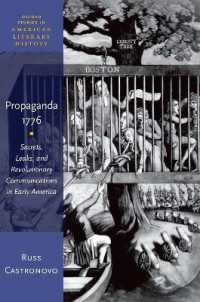Description
(Short description)
Albert Camus' Werk ist nach wie vor von brisanter Aktualität. Die Beiträger des Bandes weisen auf die Vielfalt in diesem _uvre hin und geben wichtige Impulse für eine intensive Auseinandersetzung mit Camus: Der erste Teil des Bandes beschäftigt sich mit dem Thema Engagement und versammelt Beiträge zu Fragen von Philosophie, Ethik und Politik. Der zweite Teil widmet sich unter der Überschrift Ästhetik dem literarischen Werk Camus' und dessen Narrativik und Dramatik. Der dritte Teil schließlich untersucht das Verhältnis von Tradition und Moderne und behandelt Fragen der Rezeption und der Intertextualität. 100 Jahre Camus
(Text)
Through his literary, philosophical and contemporary critical works, Albert Camus counts among the greatest French intellectuals of the 20th century. Although Camus still reaches a large number of readers today, there is no extensive institutionalised Camus research at universities. This anthology is published within the temporal context of his 100th birthday and the 50th anniversary of his death. As a representative of a 20th-century generation, Camus seems to have become a mythological figure, who understood historic and individual catastrophes to be personal challenges and firmly believed that humanitarianism will prevail.The volume is divided into three main chapters. The first chapter brings together treatises on philosophical, ethical and political questions under the heading Commitment; the second, under the heading Aesthetics, his works on narratives and drama; the third, finally, is dedicated to the relation between tradition and modernity and deals with questions of reception and intertextuality.
(Text)
Through his literary, philosophical and contemporary critical works, Albert Camus counts among the greatest French intellectuals of the 20th century. Although Camus still reaches a large number of readers today, there is no extensive institutionalised Camus research at universities. This anthology is published within the temporal context of his 100th birthday and the 50th anniversary of his death. As a representative of a 20th-century generation, Camus seems to have become a mythological figure, who understood historic and individual catastrophes to be personal challenges and firmly believed that humanitarianism will prevail.
The volume is divided into three main chapters. The first chapter brings together treatises on philosophical, ethical and political questions under the heading Commitment; the second, under the heading Aesthetics, his works on narratives and drama; the third, finally, is dedicated to the relation between tradition and modernity and deals with questions ofreception and intertextuality.






